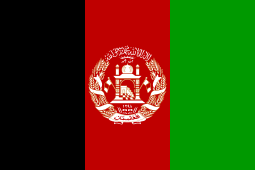Afghan diaspora
 | |
| Regions with significant populations | |
|---|---|
| Pakistan | 1.5 to 2.5 million[1] |
| Iran | 1,380,000[2] |
| UAE | 300,000[3] |
| Germany | 247,000 (People holding Afghan citizenship)[4] |
| United States | 97,865 (2014 ACS)[5] |
| United Kingdom | 56,000[6] |
| The Netherlands | 44,000[7] |
| Austria | 35,108[8] |
| Australia | 19,416[9] |
| India | 13,000-31,000[10] |
| Canada | 16,240[11] |
| Denmark | 15,854[12] |
| Sweden | 6,904[13] |
| Turkey | 3,900 |
| Qatar | 3,500[14] |
| Languages | |
| Pashto, Dari (Afghan Persian) or languages spoken in the respective country of residence | |
| Religion | |
| c. 99% Islam followed by c. 1% other religions | |
Afghan diaspora or Afghan immigrants are citizens of Afghanistan who have immigrated to other countries, or people of Afghan origin who are born outside Afghanistan. Traditionally, the borders between Afghanistan and its southern and eastern neighbouring countries have been fluid and vague.[15] Like other nations that were created by European empires, the borders of Afghanistan with neighboring countries often do not follow ethnic divisions, and several native ethnic groups are found on both sides of Afghanistan's border.[16] This means that historically there was much movement across present day barriers.[16]
Since the Soviet invasion of Afghanistan in 1979, a total of about 6 million Afghan refugees have settled in neighboring Pakistan and Iran.[17] However, between 2002 and 2015, more than half of that population have been repatriated to Afghanistan with UNHCR's assistance. In the same period, several NATO countries that were part of ISAF granted political asylum to smaller number of Afghans that worked with their respective forces.[18] As opposed to fleeing to neighboring Pakistan or Iran, Afghan Sikhs and Afghan Hindus, often journeyed to India.[19] Those who were granted asylum or immigrant visas eventually made it to Western countries, where many other Afghans had gone for permanent settlement. Afghan natives now reside in at least 78 countries around the world.[20]
Some of the refugees returning to Afghanistan from Pakistan complain that "they have been beaten and slapped and told nobody in Pakistan wants them anymore."[21] Afghans returning from Iran experience similar or worst punishments.[22] However, most of them have not experienced such incidents but are leaving Pakistan on their own choice, and a number of those are making new journeys to the European Union (EU) to seek asylum.[22] The Pakistani government has agreed that no Afghan refugee would be forcefully removed from its country. Under an agreement between Afghanistan, Pakistan and the UNHCR, the Afghans in Pakistan are officially allowed to remain until the end of 2017. The Afghans in Iran have also been given extended time.
See also
References
- ↑ "UNHCR country operations profile - Pakistan". United Nations High Commissioner for Refugees. Retrieved September 16, 2015.
- ↑ "Balkhi visits Islam Qala to assess returnees' registration". Pajhwok Afghan News (PAN). September 11, 2015. Retrieved September 15, 2015.
- ↑ Shahbandari 2012
- ↑ Mehr als 12 000 Afghanen sollen Deutschland verlassen Retrieved November 27, 2016.
- ↑ "2014 American Community Survey 1-Year Estimates: Afghan". United States Census Bureau. Retrieved 7 February 2016.
- ↑ Jones 2010, p. 2
- ↑ http://decorrespondent.nl/2826/Dit-is-het-Nederland-van-44000-Afghanen-/475317125712-6199981d
- ↑ http://www.statistik.at/web_de/statistiken/menschen_und_gesellschaft/bevoelkerung/bevoelkerungsstruktur/bevoelkerung_nach_staatsangehoerigkeit_geburtsland/index.html
- ↑ Australian Bureau of Statistics 2006
- ↑ Associated Press 2013
- ↑ Statistics Canada 2006
- ↑ Denmark Bureau of Statistics 2014
- ↑ Government of Afghanistan 2007
- ↑ bq magazine - Qatar´s population by nationality
- ↑ "The Durand line:History, Consequences, and Future" (PDF). Retrieved 4 June 2014.
- 1 2 Carberry 2013
- ↑ United Nations High Commissioner for Refugees 1999
- ↑ Stainburn 2013
- ↑ Bose 2006
- ↑ Braakman, Marije. "Roots and Routes: Questions of Home, Belonging and Return in an Afghan Diaspora" (PDF).
- ↑ Joseph Goldstein (February 23, 2015). "Refugees Are Pushed to Exits in Pakistan". The New York Times. Retrieved February 24, 2015.
- 1 2 Joseph Goldstein (September 13, 2015). "For $14.50, Afghan Refugees Make a Desperate Bet on a Way Out". The New York Times. Retrieved September 15, 2015.
Further reading
- Government of Afghanistan (2007). "Embassy of Afghanistan in Sweden". Government of Afghanistan. Retrieved November 7, 2013.
- Associated Press (July 24, 2013). "Tough times follow Afghan refugees fleeing Taliban to Delhi". The Indian Express. Retrieved November 7, 2013.
- Australian Bureau of Statistics (2006). "20680-Ancestry (full classification list) by Sex - Australia". Australian Bureau of Statistics. Retrieved November 7, 2013.
- Bose, Nayana (March 10, 2006). "Afghan refugees in India become Indian, at last". United Nations High Commissioner for Refugees (UNHCR). Retrieved November 7, 2013.
- Iqbal, Mohamed (July 7, 2012). "Kabul looks to Qatar support at aid meet". The Peninsula. Retrieved November 7, 2013.
- Jones, Sophie (July 2010). "Afghans in the UK" (PDF). Information Centre about Asylum and Refugees. Retrieved November 6, 2013.
- National Geographic Society (2013). "Afghan Migration after the Soviet Invasion" (PDF). National Geographic Society. Retrieved November 8, 2013.
- Nordland, Rod (November 20, 2013). "Afghan Migrants in Iran Face Painful Contradictions but Keep Coming". The New York Times. Retrieved November 22, 2013.
- Shahbandari, Shafaat (November 30, 2012). "Afghans take hope from UAE's achievements". Gulf News. Retrieved November 5, 2013.
- Stainburn, Samantha (May 22, 2013). "UK, Denmark to give Afghan interpreters visas". GlobalPost. Retrieved November 5, 2013.
- Statistics Canada (2006). "Immigrant population by place of birth and period of immigration (2006 Census)". Statistics Canada. Retrieved November 7, 2013.
- "UNHCR Global Report 2005: Turkey" (PDF). UNHCR. 2005. Retrieved November 7, 2013.
- United States Census Bureau (2013). "2011 American Community Survey 1-Year Estimates". United States Census Bureau. Retrieved November 5, 2013.